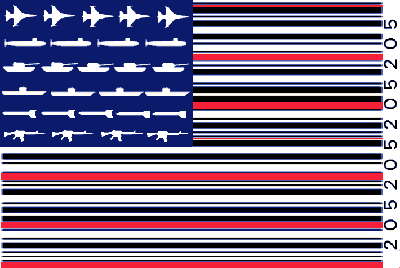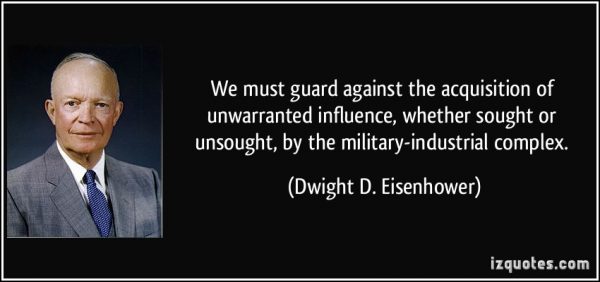NZ companies complicit in culture of violence, intolerance and oppression « The Daily Blog
Christine Rose

War is great for business. About $1.68 trillion worth of business globally as of 2015. Defence market reports say global tension and conflict will drive ongoing defence spending, “leading to global market opportunities for exporters”. Even here in NZ, our comparatively small defence budget is increasing, and NZ based military technology manufacturers are poised to capitalise on market opportunities generated by instability, superpower aggression and conflict around the world.
Already the NZ defence industry generates about $60million per annum, and employs about 2500 people. The defence force itself has the massive budget of $3,261 million for the 2017/18 year with an almost $100 million funding boost in this year’s budget, and an additional $406million over four years for increased operational expenses, and $576million for capital projects. That’s a lot of money in both public and private sector involvement in the potential creation and dissemination of instruments of death.
Business opportunities provided by a thriving arms market are promoted by the NZ Defence Industry Forum which held its annual conference in Wellington this week. The Defence Industry Forum (NZDIA) facilitates discussions between defence suppliers and defence agency buyers, from here and around the world. The NZDIA brief is to “identify niche markets worldwide and optimise foreign exchange returns on assets of its members, …with a focus on gaining and maximising onshore and offshore defence contracts”. According to one of the referees on their website, ‘they’re one of the most effective industry forums in New Zealand”, reflected in the Government’s budget increases perhaps. But beyond the opportunities of expanding domestic military expenditure, New Zealand companies are benefitting from the global death trade. With the military as agents of state sanctioned violence, companies supporting the arms trade here and abroad, are war profiteers, complicit in a culture of violence and oppression.
And it seems that industry is booming. The Defence Industry Association annual conference was attended by around 500 delegates and 150 organisations. The conference is usually sponsored at least in part, by one of the world’s largest (worst?) arms manufacturers, Lockheed Martin. Representatives of other major weapons companies also attend. But smaller domestic companies who manufacture mortar firing devices, combat training systems, missile guidance technology, weapons and ammunition, transport, procurement and logistics systems, cyber security and military electronics are all there. We’ve got ‘arms dealers on our doorstep’. It’s an opportunity for these industries to buy, sell and lobby for ‘more weapons of war’. War in itself helps their trade.
Intolerant conservatives in NZ were appalled at the behaviour of protestors who sought to blockade, interrupt and disrupt the Defence Industry conference. In online comments, protestors were called ‘street thugs’, ‘rent a mob’, ‘the dregs of society’. They should “get a job, get a life, and if they want change, they should get elected”. Ironically Chloe Swarbrick, newly elected Green MP attended the conference blockade, as did the recently awarded Nobel Peace Prize winner Thomas Nash, recognised for his opposition to nuclear weapons. And many of the protestors were working people who considered the issue of NZ’s involvement in the death trade sufficiently morally important that they used annual leave so they could attend.
Among the protestors was ‘Uncle Scam’ dressed in stars and stripes, wearing a ‘wanted for war crimes’ sign, and carrying another asking conference attendees ‘is it ok when it’s not your family?’ with pictures of falling bombs. There were clowns, men, women and children, people carrying flowers, and a celebratory ‘give peace a dance’ event.

Peaceful protestors blockading the route for delegates to the conference, were manhandled, apparently brutalised, and some people were insulted and injured by the police. Protestors say the police used inappropriate force, which the police deny, saying ‘they were extremely disappointed with the behaviour of protestors”, but protestors said if they’d acted the way the police did, they would have been arrested. The police have the long arm and the upper hand of the law.
Protestors questioned why the police were enforcing security at an industry event, which should be paying for its own security, and the cops were acting as ‘lap dogs to big business’. It’s a bizarre paradox; Wars have been fought to ‘preserve democratic freedoms’ which are suppressed by the police because those same freedoms are used to question the trades of war.
Some of the ‘appalling behaviour’ exhibited by protestors included spitting on conference delegates, and one online contributor suggested even ‘rebelling against the police is despicable behaviour’. It’s a sick world where war mongers and military equipment mercenaries are protected by the state, and those who bear witness and raise awareness of militarism, where the purpose is to kill, are condemned. Non-violent direct action is seen through this lens as a greater crime than direct and violent action through organised military means. In this context, even violent action would be appropriate to stop the dogs of war, but society condemns those who stand for peace, not force, as well as those who would use force to stop it.
Once again the power of the dollar trumps moral questions of the trade in murderous weapons. Turning a blind eye to the proliferation of the tools of war, and their production here in New Zealand, is the same as the American blind spot to gun related harm, but on bigger scale. Edmund Burke said, ‘all that is necessary for the triumph of evil is for good men to do nothing’. And Malcolm X said, ‘if you’re not careful, the newspapers will have you hating the people who are being oppressed, and loving the people who are doing the oppressing.” This week, righteous and honourable men and women spoke truth to power, and stood against evil that’s institutionalised in the state, and such a cultural norm that the non-violent protestors were condemned more than the purveyors of war.
No comments:
Post a Comment